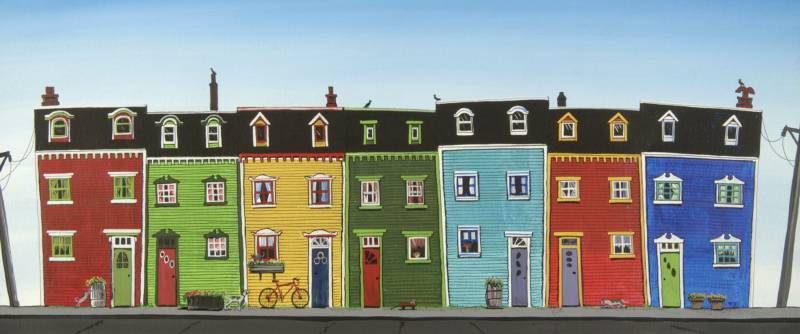let's go home.
let's go to home.
let's go house.
let's go to house.
I'm going home
I'm going to home
When should I use 'home' and when should I use 'house'.
let's go home.
let's go to home.
let's go house.
let's go to house.
I'm going home
I'm going to home
When should I use 'home' and when should I use 'house'.
There is a noun home and a noun house. There is also a preposition home too.
The most important aspect for this question is the preposition home, but I'll say a little bit about the nouns house and home first.
The noun House
Your house is the physical building that you live in - and it must be a house, not a flat! A house has rooms on the ground floor. It also usually has a front door on the ground floor. A flat is not a house!
Here's a picture of some houses:

Here's a picture of some flats:

So houses are physical buildings. A flat is part of a larger physical building.
The noun Home
Your home is any place where you feel that you belong. It is usually a safe place. It's a place that you know very, very well. It's a place you look after and like to be in - usually. It might be a house or a flat or a caravan, or a city, or even a country. If you know a city well and you feel good there, and you feel that you belong there, you can say:
It doesn't matter whether a home is a type of building or not. Many animals have homes. They don't usually have flats or houses though!
The preposition home
We can use the preposition home like other prepositions, for example in, up, down, inside. The preposition home means "to or in your home":
Like with other prepositions we can use the preposition home with the verb BE:
Like many other prepositions, home can occur with other prepositions:
With the verb GO, we don't use the preposition to as well as another preposition. The following sentences are ungrammatical:
We use the special adverbs straight and right with prepositions:
Note
Notice that we can use nouns after the preposition to. So the following sentences are ok:
Here we are using the noun home, not the preposition. If you use the noun home in this way it will usually have a determiner (a, the, this, my ...) or it will be plural. It may also have adjectives:
In the example above, we see the noun home. We know it's the noun because it is plural homes not home. Also, it has an adjective different. Notice that in this example, the noun homes does not have a determiner. Because we are using the noun home, we still need to use the preposition to with the verb GO here.
Hope this is helpful!
Generally, the word 'house' refers to a building. On the other hand, the word home has some emotions in that.
The preposition at is possible with home.
Let's go. She must be at home
But then, use prepositions with home carefully. A note from the Cambridge Dictionary is very good to refer.
We use home as an adverb with verbs of movement such as get, go, come, arrive, travel, drive. We don’t use 'to'.
I strongly recommend reading the entire page. This clarifies many things about home/house and using prepositions.
I believe the reason we say "to go home" is because in this use "Home" is an "adverb of place". "House" does not have that use so does not work in that form.
In "go to my home" and "go to my house" we are using them as nouns. Both words can be nouns, adjectives or verbs in the right context.
Other adverbs of place include "abroad", "upstairs", compass directions, and "outside"
(The differnce in meaning between "house" and "home" is why "housework" and "homework" are completely different activities.)
The expression is "to go home". You don't say "to go to home" and you don't say "to go house". "to go home" is a fixed idiom that you can't change.